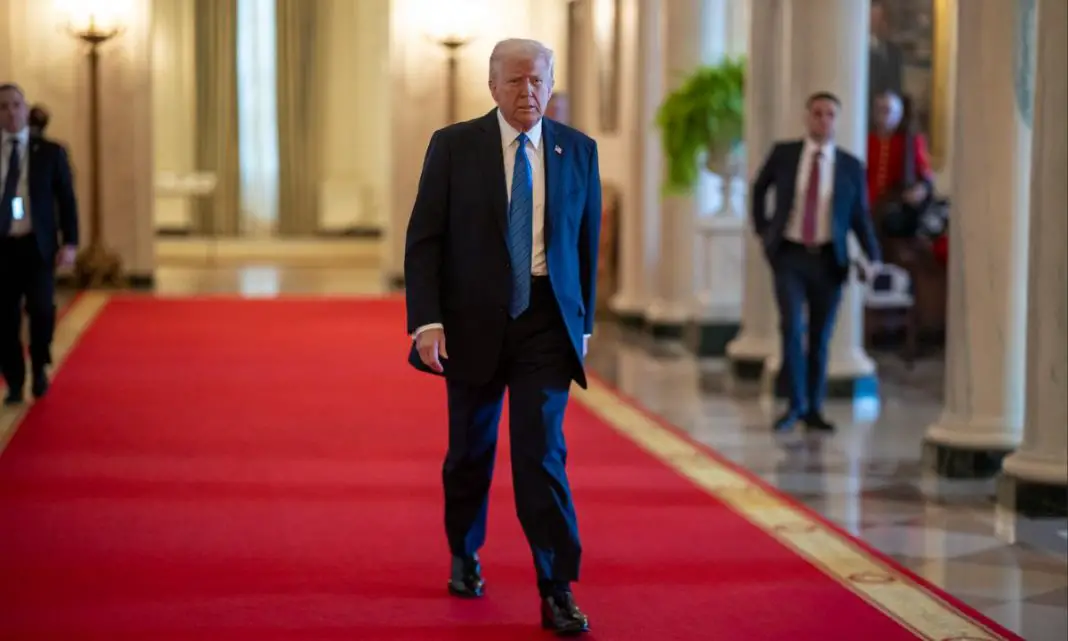It’s no secret that the United States needs to reform its elections. As one of the most advanced countries in the world, there’s no excuse for America’s elections to have as many glitches as they do now. President Donald Trump realizes that the country’s elections need an overhaul which is why he recently signed an executive order to get the ball rolling.
The order seeks to secure federal elections by requiring proof of citizenship. This seems like a pretty common sense item that almost everyone can agree on regardless of political affiliation. The American people want to know that their elections are secure when they head to the ballot box. One way of making them secure is by cracking down on non-citizens voting.
But the Trump administration is learning that not everyone is a fan of the president’s recent executive order. In fact, leading Democrats have put together a lawsuit to challenge the order, a move that’s puzzling to many who think it’s simply rooted in common sense.
Trump’s Election Overhaul Order Sparks Legal Firestorm
An executive order signed by President Donald Trump last week, aimed at reshaping the way America conducts its elections, is already hitting turbulent waters. Just days after its unveiling, the directive is facing not one, but two lawsuits—one spearheaded by heavy-hitting Democrats—challenging its legitimacy and reach.
The first legal salvo came Monday afternoon from the Campaign Legal Center and the State Democracy Defenders Fund. Hot on its heels, a second suit was lodged by a coalition of Democratic powerhouses: the Democratic National Committee, the Democratic Governors Association, and top Senate and House Democratic leaders. Filed in the U.S. District Court for the District of Columbia, both cases demand that Trump’s order be halted and struck down as unlawful.
At the heart of the Democrats’ complaint, crafted by the Elias Law Group, is a sharp rebuke of the order’s sweeping ambitions. “The Executive Order seeks to impose radical changes on how Americans register to vote, cast a ballot, and participate in our democracy—all of which threaten to disenfranchise lawful voters and none of which is legal,” the lawsuit contends. It zeroes in on specifics, slamming tighter mail-in ballot deadlines, Trump’s “President’s own design preferences” for “congressionally mandated voter registration forms,” and what it calls “the President’s unlawful effort to upturn the electoral playing field in his favor and against his political rivals.”
Legal experts, cited by the Associated Press, have raised red flags, warning that elements like a new proof-of-citizenship rule for voter registration and stricter ballot deadlines might clash with the U.S. Constitution. The order’s scope, they argue, stretches into territory the president may not legally control—like meddling with the U.S. Election Assistance Commission, an independent body tasked with setting voluntary voting guidelines and managing the federal voter registration form.
Trump, for his part, isn’t backing down. On March 25, the day he signed the order during a White House meeting with ambassadors, he took to Truth Social to trumpet its significance. “We believe that this Executive Order is the farthest-reaching executive action taken in the history of the republic to Secure our Elections,” he wrote, framing it as a historic move to safeguard the vote.
But the lawsuits paint a starkly different picture. The Democrats’ filing zeroes in on a controversial player: the Department of Government Efficiency (DOGE), a cost-cutting arm of the administration. The order mandates DOGE to cross-check federal data with state voter rolls—a move the suit claims tramples on privacy rights and could expose Democrats to harassment “based on false suspicions that they are not qualified to vote.”
Not everyone’s opposed, though. Election officials in some Republican-led states have cheered the order, arguing it could curb voter fraud and equip them with federal data to sharpen their voter lists. Yet, if the courts greenlight Trump’s plan, the practical fallout could be messy. State election offices, already stretched thin after losing some federal cybersecurity support, might face new costs and logistical hurdles—think revamping voting systems or launching voter education campaigns to explain the changes.
Then there’s the proof-of-citizenship hurdle, which critics say could sow chaos. Millions of eligible Americans lack easy access to documents like passports or birth certificates. Kansas offers a cautionary tale: when it enforced a similar rule for three years before it was struck down, the state’s own expert found that nearly all of the roughly 30,000 people blocked from registering were, in fact, eligible U.S. citizens.
And while some headaches and growing pains may emerge from Trump’s order, if the courts uphold it, it will certainly bring back much needed integrity to the nation’s elections. If the kinks can get ironed out properly, the executive order could shape up to be a major success.
Do you support this executive order by President Trump? Why or why not? Let us know down in the comments!


Democommunist objection to Trump’s executive order proves just how corrupt they are and how corrupt the elections are. Any thing which changes the process is sure to interfere with their corruption and they won’t allow that if they can stop it..
As the Constitution stipulates only a citizen may exercise the right to vote, it’s only reasonable to make sure that only citizens DO exercise that right, and, prove they have that right. This law suit is in my opinion, just more Democrat bulls**t to allow cheating.